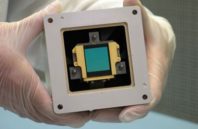A collaboration between researchers at Yale University and Barcelona’s Institute of Photonics Sciences (ICFO) has made a graphene-based device that could result in tiny new uncooled detectors operating in the mid-infrared spectrum.
Current commercial mid-infrared sensors – operating in the useful “fingerprint” region full of molecular-specific spectroscopic information – require expensive photodetector materials, while their need for cooling makes for bulky instrumentation.
The Yale-ICFO team’s sensor, operating at 12.2 µm in the heart of the mid-IR spectrum, consists of arrays of plasmonic resonators. Measuring just 5 µm by 5 µm, the devices have shown good low-noise performance at room temperature, without any cooling.
“It is fabricated using large-scale graphene and possesses a simple two-terminal geometry, representing an essential step towards the realization of an on-chip graphene mid-infrared detector array,” reports the collaboration – led by ICFO’s Javier Garcia de Abajo and Yale’s Fengnian Xia – in a paper just published in the journal Nature Materials.

 (585) 768-2513
(585) 768-2513

